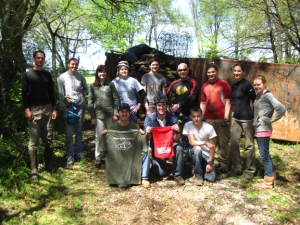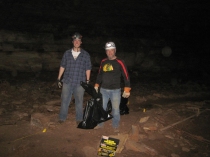WKU News
Green River Grotto, other groups clean Crumps Cave
- Tuesday, April 30th, 2013
On April 21, five years of hard work for the Green River Grotto student organization and WKU’s Hoffman Environmental Research Institute, with help from numerous other like-minded organizations, including the Greater Cincinnati Grotto, Louisville Grotto, Hart of Kentucky Grotto, Pine Mountain Grotto, and the American Cave Conservation Association, culminated in a grand cleanup at the Crumps Cave Education and Research Preserve in Warren County.

Members of the Green River Grotto and other groups cleaned Crumps Cave Education and Research Preserve in Warren County on April 21. Front row (from left): Clint Barber, Kegan McClanahan, Tristin Thomas; back row: Sergey Tokarev, Tammy Britt, Merrie Richardson, Cayce Johnson, Alex Goldman, Phil Goldman, Dorian Goldman, Laura Sangalia, Megan Remillard.
This effort has been an ongoing one for the Grotto and Hoffman Institute in order to restore this fragile cave ecosystem back to its natural state.
Crumps Cave, which had served as a tourist cave, was purchased by WKU in 2008 with funds from the Kentucky Heritage Land Conservation Fund. The cleanup last weekend is part of an ongoing effort to remove old tourist infrastructure and human impacts, such as wiring from trail lighting, a treated lumber boardwalk, old metal, bottles, and other garbage that washed, or was dumped, into the cave over many decades. The cave serves as a highly important research site for various projects by students and faculty at WKU involving water quality, climate change and groundwater resources, and is home to the endangered Gray bat (Myotis grisescens).
Much of the cleanup was focused on the remnants of debris left behind in May 2010, when the major flood that impacted the area caused widespread damage, including the flooding of Crumps Cave and the destruction and scattering of the trash pile that the groups had already collected for removal near the cave’s entrance. Despite this setback, several small cleanups to gather these materials together finally paid off in a 20-yard dumpster of garbage being removed from the site.
With help from the Twin Lakes Karst Conservancy and the Windy City Grotto, the April 21 event was the final push to finish the majority of the cleanup efforts and restore the site to the original vision of a natural, safe research and education preserve.
“The Grotto has actively engaged in many of these types of cleanup and outreach efforts, and the Crumps Cave cleanup is a great milestone to reach given the amount of effort and time volunteered by its members, along with many other very generous groups, to make this all possible,” said Green River Grotto faculty advisor Dr. Jason Polk. “Crumps Cave will serve as a safe, functional, and very important research and educational site for many years to come, and much thanks is owed to the perseverance of local volunteers, cavers, scientists, students, and the Hoffman Institute in bringing this to fruition.”
Contact: Jason Polk, jason.polk@wku.edu; or Clint Barber, clinton.barber@wku.edu.
Some of the links on this page may require additional software to view.


